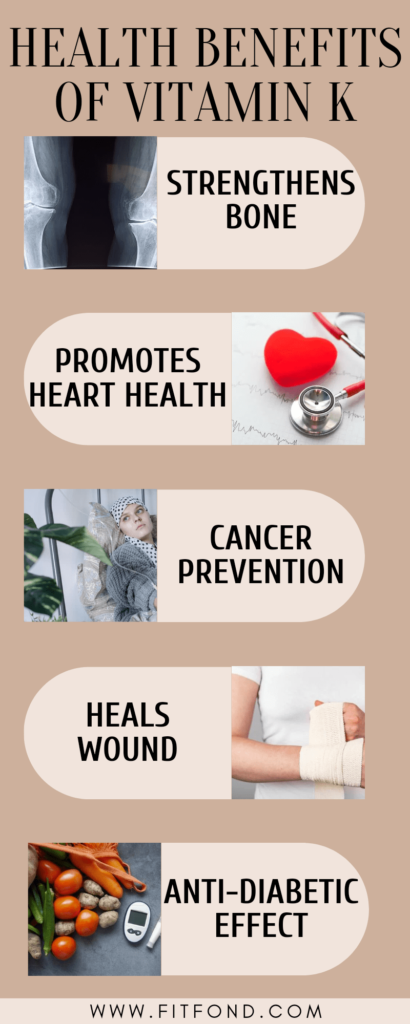Table of Contents
ToggleHealth Benefits of Vitamin K
There are a plethora of health benefits of vitamin K and it is extremely essential for living a healthy life. Let’s find out what are the “5 PROVEN HEALTH BENEFITS OF VITAMIN K” as well as the dosage, deficiency and a lot more. 7 Astounding Benefits of Vitamin E: Deficiency, Dosage and More
Brief About Vitamin K
- Vitamin K is also known as ‘Phytonadione’, which is a group of fat-soluble vitamin that play a vital role in blood coagulation/clotting, cardiovascular health and bone development. It was discovered in 1928-1930 by Carl Peter Henrik Dam at the Biochemical Institute of the University of Copenhagen as a ‘Koagulating:Coagulating’ vitamin, hence the ‘K’ came in ‘Vitamin K’.
- Vitamin K is found in 2 natural bioactive forms, vitamin K1 (Phylloquinone) and vitamin K2 (Menaquinone). There is one more form of vitamin k, known as vitamin K3 (Menadionel) which is artificially synthesised and it is not a part of dietary supplements in humans and mainly used in pet and livestock feed. 32 High Vitamin K Foods for Non-vegetarian, Vegetarian and Vegan
- Scientific evidence has shown vitamin K possesses anti-calcification, anticarcinogenic, antioxidant, anti-inflammatory, insulin sensitising and bone forming properties. Therefore, it has several health benefits and is used to treat and manage various health complications.
5 Proven Benefits of Vitamin K

1. Benefits of Vitamin K for Skin
Studies have shown that vitamin K has significant wound healing potential. A RCT (Randomised Controlled Trial) proved that topical application of vitamin K significantly reduced the healing time in patients with minor or medium wounds.
Another meta-analysis showed that vitamin K supplementation is beneficial to increase wound healing rate, especially in animal models. 10 Amazing Benefits of Aloe Vera
2. Benefits of Vitamin K for Heart
Vitamin K helps to protect from CHD (Coronary Heart Disease), CAC (Coronary Artery Calcium) and improves vascular calcification. In the Rolter Dam study, a large-scale population biased study with 4,807 Dutch women and men (age≥55), were analyzed over a period of 10 years and it found vitamin K2 reduced the risk of dying of heart disease by 57% (25 mcg/day) and also decreased the occurrence of CHD by 41% and CAC by 52%.
A 3 year double-blind, RCT (Randomised Controlled Trial) investigated 452 patients (229 supplemented with vitamin K1 and 223 patients in the control group). The patients supplemented with vitamin K1 also showed a reduction in CHD and arterial calcification. Top 5 Scientifically Proven Benefits of Coconut Water
3. Promotes Bone Strength
A lot of evidence across the globe has shown vitamin K is extremely significant for bone strength and health. Following are some evidence:
- A randomised, placebo-controlled, double-blind trial tested 440 postmenopausal women with osteopenia for 2 years, who were given vitamin K1 (5 mg/day). And it showed that the vitamin k supplementation caused a more than 50% reduction in clinical fracture as compared to the placebo. But no effects were shown on BMD (Bone Mineral Density).
- However, a recent 3-year placebo-controlled study tested 244 healthy postmenopausal women who were given vitamin K2 (18 mcg/day) and it resulted in increased BMD, bone health and strength.
- Another meta-analysis of 13 RCTs (Randomised Controlled Trials) showed vitamin K2 (45 mg/day) significantly reduced hip, vertebral and all non-vertebral fracture.
4. Prevents Cancer
Vitamin K possesses anti-cancer property which inhibits the growth of human cancer cell lines because of which it helps to tackle various types of cancer. Two clinical trials showed that vitamin K2 (45 mg/day) reduced the development and occurrence of hepatocellular carcinoma (HCC) in liver cirrhosis patients. 10 Scientifically-Proven Health Benefits of Amla
5. Anti-Diabetic Potential
Vitamin K has insulin sensitising property which may help diabetic patients. A 3-year randomised, double-blind, controlled trial tested 355 diabetic patients with vitamin k and it showed an improvement in insulin sensitivity and glucose tolerance. 10 Scientifically-Proven Health Benefits Of Sugarcane Juice
Vitamin K deficiency
Vitamin K deficiency is often common in infants as ‘Vitamin K Deficiency Bleeding (VKDB)’. Some of the symptoms of vitamin K deficiency are:
- Poor Bone Development
- Osteoporosis
- Hemorrhage
- Significant Bleeding
- Increased Risk of CVDs (Cardiovascular Diseases)
How much vitamin K per day?
There is no such limit set for vitamin K consumption and its amount depends on various factors like gender, health condition, etc. But it is advised for adults to have 70-120 mcg vitamin K per day.
Another way to ensure adequate vitamin K intake is, to have 1 mcg vitamin A per kilogram (kg) of bodyweight.
Vitamin K Side Effects
There is no Tolerable Upper Limit (TUL) of vitamin K that has been set. Moreover, no potent side effects of vitamin K have been observed, even at higher dosages.
Takeaway
Vitamin K is a vital micronutrient and supports various physiological processes inside the body. The above mentioned “5 PROVEN HEALTH BENEFITS OF VITAMIN K” easily supports the fact that vitamin K is massively important for a healthy body. 7 Health Benefits of Vitamin A (Evidence-Based)























Really helpful 😃
Thanks
Blue Techker Hi there to all, for the reason that I am genuinely keen of reading this website’s post to be updated on a regular basis. It carries pleasant stuff.